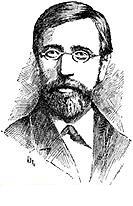
Seligman (Isaac) Baer (1825–1897) was a Masoretic scholar, and an editor of the Hebrew Bible and of the Jewish liturgy. He was born in Mosbach, the northern district of Biebrich,[1] on 18 September 1825 and died at Biebrich-on-the-Rhine in March 1897.
Baer commenced his Masoretic studies as early as 1844. He belonged to the school of Wolf Heidenheim, and had in his possession some of Heidenheim's original manuscripts and personal copies of his published works with handwritten marginal notes. Few scholars in the nineteenth century had so intimate an acquaintance with all the details of the Masorah as had Baer, and it was largely due to him that the study of this branch of Hebrew philology was brought to the notice of Biblical critics. His friendship with Franz Delitzsch, who stood sponsor for much of his work, aided him in making known to the world the results of his studies.
Baer's monumental edition of the Jewish prayerbook according to the Ashkenazic rite, Seder Avodat Yisrael (Rödelheim, 1868), accompanied by a critical commentary, became the authoritative model for numerous editions published subsequently in the 20th century. His editions of the Jewish liturgy also include Kinnot for the fast of the ninth of Av.
He never occupied an academic position, but was content with the office of Hebrew teacher to the Jewish community of Biebrich. In recognition of his services to the Commission for the History of the Jews in Germany, the honorary degree of doctor of philosophy was conferred upon him by the University of Leipzig. His edition of the Masoretic Bible was published in cooperation with Delitzsch.
- ^ Faber, Rolf (2002). Seligmann Baer: Neue Erkenntnisse zu Leben und Werk des jüdische Gelehrten aus Wiesbaden-Biebrich. Verschönerungs- und Verkehrsverein Biebrich am Rhein e.V. p. 8.